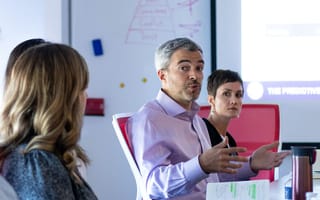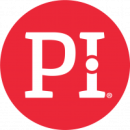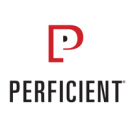
Although many companies nationwide have temporarily moved to working remotely, many Boston-area tech companies are using the change as an opportunity to make permanent improvements to their business and cultural strategies.
Hello Raye will downsize its office and put a greater emphasis on remote hiring practices. The money saved from the office will be used for more team all-hands gatherings and an annual retreat. The Predictive Index and Duck Creek Technologies are both increasing the number of virtual events they offer throughout the year, even once stay-at-home orders are lifted, to reduce travel for their staff and attendees.
Companies are also making changes in their operations to better assist their customers. Staff at Perficient, a consultancy with clients in healthcare, have daily strategy meetings on how to help these institutions improve their efficiencies amid increased patient loads. Software intelligence company Dynatrace upgraded the internet speeds for some team members at home so they could better address customer concerns.
Hello Raye’s CEO Brian Chiou said working remotely during this pandemic led to his leadership team questioning their need for a physical office space. They answered that question by implementing new remote hiring policies and downsizing their office to make room for more team gatherings.
How is your business shifting in response to the COVID-19 outbreak?
We were hoping to launch our platform to architecture and design firms during conferences in NYC and Chicago in May and June. Once we realized the conferences were canceled, we adjusted our marketing budget to doing strictly digital outreach. One of our main goals for the conferences was to get feedback from prospective customers through focus groups.
We decided to move our go-live timetable by three months as a result of COVID-19’s impact on the economy. We didn’t want to do a hard marketing and research push in the thick of things for SMBs dealing with the pandemic. However, we are gearing up for when life returns to normal and businesses are eager to adopt new solutions such as ours.
We asked, ‘Why even have an office?’”
How have you aligned your team around this shift as employees work from home?
After getting each team member on the same page with objectives while remote, we asked, “Why even have an office?”
We hope to expand our team toward the end of the year. It will be important for us to create good interviewing and onboarding processes for new team members while providing a positive culture for those remote employees. The money we’ll save on office space will be allocated to company outings. We hope to do lunches once a month with the bulk of the team based in Boston. Every quarter, we’ll have a company huddle with our two team members in Chicago and Durham, North Carolina. And we’ll establish an annual retreat for everyone to attend.
How do you think this shift will impact your business in the future?
I believe that commercial real estate will still exist when the pandemic is over. Hello Raye’s future depends on commercial projects or people looking to upgrade their space with the help of an architecture and design firm. This crisis could pave the way for businesses and government buildings to rethink public areas, workplaces, hotels, restaurants and hospitals. It may lead to a bump in commercial projects with design firms that specialize in result-oriented space planning.
Lee Pichette, The Predictive Index’s senior VP of strategy and corporate development, said his team had to strategize on how to best serve clients amid the recent changes to global business. So, they practiced internal talent optimization — which led to promotions — and devised a multi-part service plan to provide greater value to their customers.
How is your business shifting in response to the COVID-19 outbreak?
We’re executing a three-part plan. First, we’re serving our clients more than selling them new offerings. This portion includes developing a guide for “surviving an economic downturn.” Second, we’re refocusing on what we call “product-led growth, through partners.” We want to make it easy for clients to immediately get value from our products and work with a talent optimization consultant for the first time. Third, we’re helping our network of talent optimization consultants deliver new workshops designed to help teams lead through change.
It is more important than ever to be intentional with how, when and what we communicate. ”
How have you aligned your team around this shift as employees work from home?
We painted a clear client experience vision that allows every team to see their role in making “product-led growth, through partners” a reality. We used talent optimization to understand where roles have changed and new roles needed to be created. We then made sure that we had the right people in the right roles, which led to some internal promotions.
Given that all employees are working remotely, it is more important than ever to be intentional with how, when and what we communicate. Our senior VP of operations introduced new no-meeting time blocks in the mid-morning, lunchtime and mid-afternoon. Employees are encouraged to use this time for child care, exercise or professional development. And we use Zoom to host town halls, where anyone can anonymously submit a question to the leadership team. We also send short video updates via Soapbox by Wistia and have sequenced team stand-ups.
How do you think this shift will impact your business in the future?
In March, a significant number of management consulting firms signed on to be certified partners of ours. Many of these firms have long wanted to add a talent optimization practice to their offerings. However, they are acting now that their clients need help with talent more than ever and partners are able to set aside time to attend our virtual launch program.
Our efforts to help our current clients weather the storm, like moving to virtual workshops, will likely be here to stay. In the long term, shifts like that one will make it easier for future clients to get started and adopt talent optimization.
Healthcare institutions are undergoing digital transformations in the wake of increased demand during this pandemic. Perficient health solutions GM Paul Griffiths said that trend of optimization will continue once business returns to normal, and when it does, the company will work to help these institutions restaff and boost their revenues.
How is your business shifting in response to the COVID-19 outbreak?
Our clients in the healthcare industry are on the front lines of fighting the coronavirus pandemic. During this crisis, hospitals have an increased focus on stability and information sharing. We created a virtual “war room” of daily meetings to pull together strategies and help our clients get the most accurate information to consumers and take a load off of their call centers. For example, we launched a free COVID-19 self-assessment chatbot with our friends at Drift in three days.
After COVID-19 passes, digital transformation will be here to stay.”
How have you aligned your team around this shift as employees work from home?
All of our employees are now working at home, though we’ve left the offices open so they can access resources as needed. We’ve been leaning on the experience of our team members who already work remotely to help us during this transition. We keep in touch by instant messaging and video conferencing, which include frequent stand-ups for the whole team.
We established Slack channels for COVID-19, where our strategists and account directors collaborate in real time to find solutions to clients’ needs. They also provide proactive advice we can funnel to clients as we see their needs emerge.
How do you think this shift will impact your business in the future?
Healthcare was already in the midst of a digital transformation as leaders embraced the outreach potential of search engine marketing, user experience and additional tactics. After COVID-19 passes, digital transformation will be here to stay. Most hospitals built virtual visits solutions in weeks, solving a challenge it can sometimes take years to answer. Now, we have to figure out how to bring revenue back and deploy the human capital needed to restaff institutions as quickly and safely as possible.
After Duck Creek Technologies canceled a spring conference, CMO Scott Fitzgerald said the company moved the event to a digital space. Planning this new digital event took new levels of virtual coordination since their workforce moved remote. Planning this digital event in a remote space gave the team valuable insight into what a successful virtual gathering looks like.
How is your business shifting in response to the COVID-19 outbreak?
One significant change we made was rescheduling our annual user conference, Formation, that was originally scheduled for April. Because we know that our customers, partners and employees derive a lot of value from that conference, we are hosting a virtual event later in the spring with similar content, interactive features, live talks and more.
We plan to continue hosting virtual events throughout the year.”
How have you aligned your team around this shift as employees work from home?
Our company was deliberately architected to allow for a 100 percent remote workforce, so this shift hasn’t had much of an impact on how we collaborate and achieve our goals. Designing a virtual event via online meetings and remote work is actually great preparation for hosting and presenting the event itself. In many ways, this is a useful exercise for our team.
How do you think this shift will impact your business in the future?
We plan to continue hosting virtual events throughout the year, and we are making this a permanent part of our annual agenda. While we will continue hosting Formation, we know that offering virtual events on a regular basis will give us more opportunities to give valuable content to our customers and partners, especially those who are unable to attend a conference in person.
Dynatrace’s CFO Kevin Burns said the company’s leadership team wanted to help businesses in increased ways during this time of economic turbulence. So they decided to make multiple aspects of their product free to new and existing users.
How is your business shifting in response to the COVID-19 outbreak?
COVID-19 is accelerating the imperative for organizations to move to digital. They’re looking to software and applications to keep their operations running smoothly. Dynatrace helps keep these applications and their underlying cloud services and infrastructure running, giving companies the freedom to drive innovation and optimize business outcomes during this time.
We know we have a role to play to help organizations respond to COVID-19. To help them stay up and running and maintain digital performance, we are offering free access to our platform for a limited time. New users and existing customers will also receive free access to our real user monitoring for SaaS vendor experience through September.
We enacted our business continuity plan early in March to help protect our employees.”
How have you aligned your team around this shift as employees work from home?
We enacted our business continuity plan early in March to help protect our employees, and transitioned everyone to working from home. We provided certain teams with upgraded internet speeds. In addition, we’re ensuring our globally-based Dynatrace ONE representatives, technical support teams and field services consultants are ready to help customers at any time.
To help protect our customers, partners, employees and their families, we stopped all nonessential travel and are conducting business via Zoom. We also transitioned our live events from in-person to a digital format.
How do you think this shift will impact your business in the future?
The pandemic has shown that all of us need to be better prepared to face the unexpected, and it has accelerated the imperative for organizations to digitize. Organizations will turn to apps, cloud, DevOps and digital user experiences in a big way. Companies with dynamic, multi-cloud environments need high-fidelity details to understand what’s going on in their businesses, without data silos or stitching tools together. We’ll continue to provide that assistance.
Related: Companies Hiring During Coronavirus















